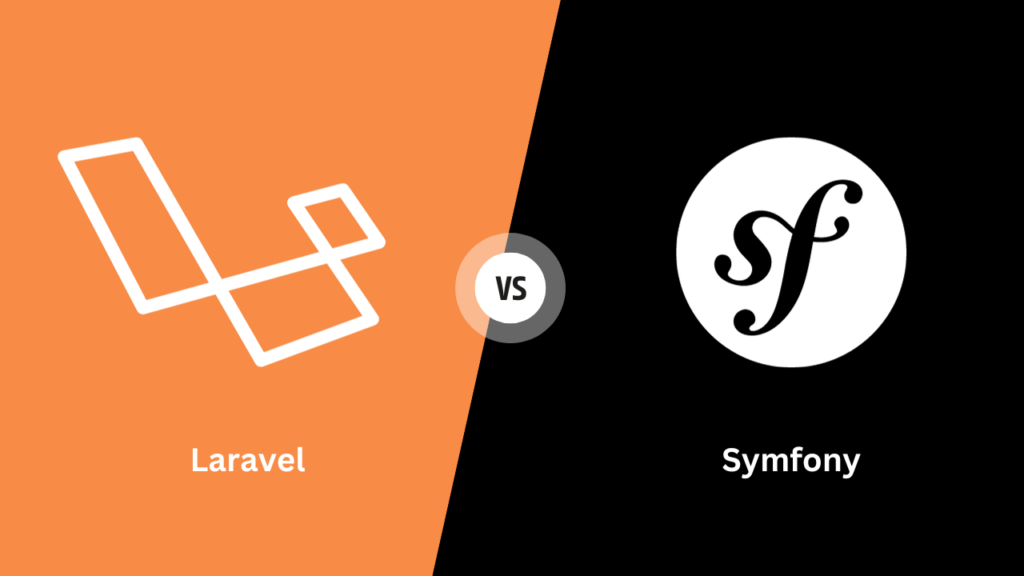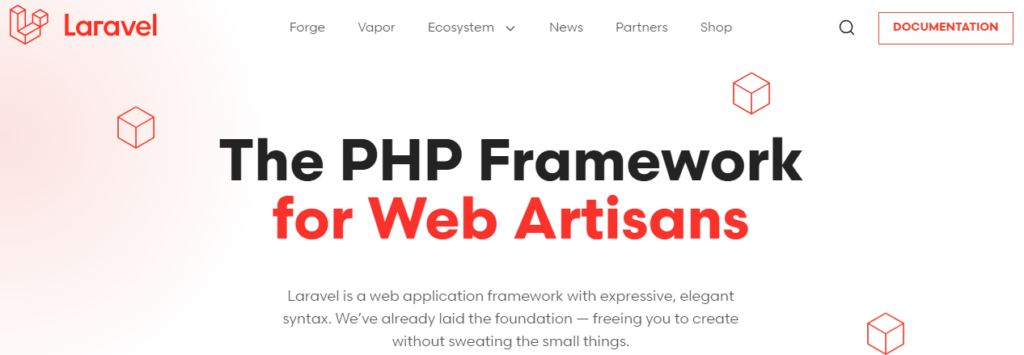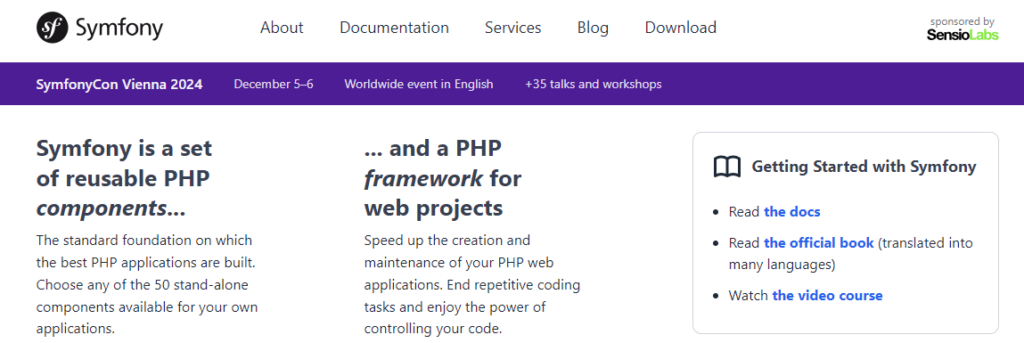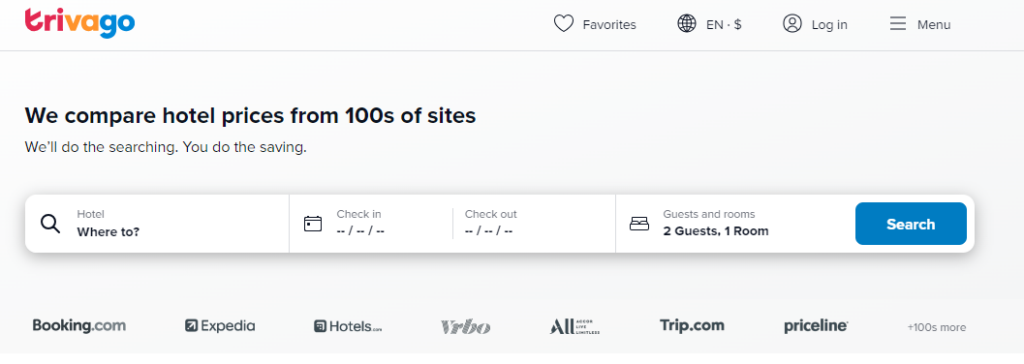
In the realm of PHP frameworks, Laravel and Symfony stand out as powerful and feature-rich choices for web developers. As we step into 2024, exploring the strengths, features, and real-world applications of these frameworks becomes crucial for businesses and developers making critical decisions. Let’s delve into a detailed comparison of Laravel vs Symfony to help you discern the best fit for your needs.
Laravel

Laravel is a renowned open-source PHP framework celebrated for its innovative and elegant syntax, which seamlessly supports the MVC (Model-View-Controller) architecture. Positioned as an established and feature-rich web application framework, Laravel has gained popularity for its rapid development capabilities and minimal need for extensive configurations.
With the recent release of Laravel 10, the framework continues to surge in popularity, leveraging existing elements from various frameworks to deliver efficient web applications. Laravel’s unique approach allows developers to bifurcate business logic and display code during the coding process, ensuring a lightweight and automated experience.
Key Features of Laravel
- Supports Model-View-Controller (MVC) Design Pattern – Laravel adheres to the MVC design pattern, promoting a structured and organized approach to development.
- Integrated Authentication and Session Solutions – Laravel offers built-in authentication and session solutions, enhancing the security of web applications.
- Enriched Unit Testing Standpoints – Laravel prioritizes efficient unit testing, providing developers with robust tools for testing and quality assurance.
- Blade Templates Engine – The Blade templating engine in Laravel simplifies the process of creating layouts for web applications.
- Access to Artisan Command-Line Tool – Laravel includes the Artisan command-line tool, automating repetitive tasks and streamlining the development workflow.
Symfony

Symfony, introduced in 2005 by SensioLabs, is a comprehensive PHP framework that incorporates a range of PHP components. Surprisingly, Laravel, despite being a leading PHP framework, utilizes around 14 Symfony components. Symfony was built with the primary goal of expediting web app development by eliminating the hassle of repetitive coding.
Symfony stands out for its reusable PHP components and robust solutions, simplifying the development of complex projects. Its versatility allows it to cater to a variety of project types, making it a widely accepted and trusted choice for scalable platforms that minimize turnaround time and errors. For teams working on such platforms, experienced Symfony developers help ensure clean architecture, long-term maintainability, and predictable performance as the project grows.
Key Features of Symfony
- Utilizes Twig Templating Language – Symfony employs the Twig templating language, enhancing the flexibility and ease of use in web application development.
- Delivers Flexible URI Routing – Symfony provides a flexible URI routing system, enabling developers to manage URLs effectively.
- Ease of Development – Symfony simplifies the development process, allowing developers to focus on building applications without unnecessary complexities.
- Quick Debugging Solutions – Symfony offers efficient debugging solutions, aiding developers in identifying and resolving issues promptly.
- Builds Structured MVC – Symfony constructs a structured Model-View-Controller (MVC) architecture, ensuring a systematic and organized development approach.
Laravel vs Symfony: Pros & Cons
To provide a clearer perspective, let’s assess the pros and cons of both Laravel and Symfony.
Get exclusive access to all things tech-savvy, and be the first to receive
the latest updates directly in your inbox.
Pros of Laravel
- Incorporates Latest and Advanced PHP Features – Laravel integrates the latest PHP features, ensuring developers have access to modern tools and capabilities.
- Enables Use of Third-Party Platforms and Integrations for API – Laravel facilitates seamless integration with third-party platforms and APIs, enhancing the functionality of web applications.
- Compatibility with Automated Testing Models for Time Savings – The framework supports automated testing models, saving time and ensuring the reliability of web applications.
- Efficient Template Engine for Developing Layouts – Laravel’s template engine allows developers to create layouts for web applications efficiently.
- Efficient Framework for Rapid Development – Laravel is recognized for its rapid development capabilities, making it suitable for projects with tight timelines.
- Easy-to-Learn and Readable Syntax – Laravel boasts an easy-to-learn and readable syntax, simplifying the onboarding process for developers.
- Permits Modification and Addition of Features Without Impacting Core Functionality – Developers can easily modify and add new features to Laravel applications without disrupting the core functionality.
Cons of Laravel
- Some Heavy Applications May Experience Slow Loading Times – Despite being scalable, heavy applications in Laravel might encounter slow loading times.
- New Versions May Face Compatibility Issues – With new versions, there is a risk of compatibility issues arising, impacting existing applications.
- Storing Excessive Database Queries May Cause Congestion – Storing a large number of database queries may lead to backend data congestion in Laravel.
- May Face Challenges with Few Third-Party Libraries – Laravel developers may encounter challenges with certain third-party libraries, affecting predictability.
Pros of Symfony
- Beneficial for Customized Web Applications – Symfony is ideal for creating customized web applications tailored to specific business needs.
- Endorsed by Platforms like Drupal and Magento – Symfony is recommended by major platforms like Drupal and Magento, attesting to its reliability and flexibility.
- First Choice for Heavy Projects Due to Performance-Rich Features – Symfony excels in handling heavy projects, offering performance-rich features and minimizing complexity.
- Access to a Wider Range of Components – Symfony provides access to a broader range of components, reducing the need for lengthy and complicated code.
- Efficiently Supports and Operates Heavy Databases – Symfony efficiently supports and operates heavy databases, ensuring optimal performance.
- Simplifies Unit Testing Process – Symfony simplifies the unit testing process, making it a preferred framework for developers.
Cons of Symfony
- Learning and Upgrading the Framework Might Be Time-Consuming – For developers, learning and upgrading Symfony and its components may require additional time and effort.
- Development Process Tends to Be Slow-Paced – The development process in Symfony may be slower compared to more streamlined frameworks.
- Overall Testing Takes More Than Average Time – The comprehensive testing process in Symfony might take more time than average, impacting project timelines.
- App Performance Affected by High Traffic – Symfony’s application performance may be affected during periods of high traffic.
- Some Elements Originating from Other Technologies May Impact Loading Speed – Certain elements in Symfony have origins in other technologies, potentially leading to sluggish loading speed.
Real-World Examples of Laravel and Symfony
Let’s explore real-world examples of successful applications built using Laravel and Symfony.
Laravel Framework Examples
Laravel has been utilized by numerous businesses and projects across various industries. Here are some notable examples of websites and applications built with the Laravel framework:
1. Cachet

Cachet is an open-source status page system that enables companies to communicate real-time status updates with their users. Laravel is the foundation of Cachet, providing a reliable and efficient framework for managing status information and incidents.
2. World Walking

World Walking is a fitness app that encourages users to track their physical activity while virtually exploring different locations. Laravel powers the backend of World Walking, contributing to the app’s seamless functionality and user experience.
3. The Artsy Podcast

The Artsy Podcast is an online platform that hosts discussions and interviews about art and culture. Laravel is used to manage the backend of The Artsy Podcast, ensuring a smooth and responsive platform for art enthusiasts.
Symfony Framework Examples
Symfony, known for its flexibility and modularity, has been widely adopted in various industries for developing robust web applications. Here are examples of websites and applications built with the Symfony framework:
1. Spotify

Spotify, a renowned music app with over 75 million users, relies on Symfony. Symfony handles maintenance, controls application requests, and enhances efficiency with personalized features.
2. Trivago

Trivago, a hotel booking app, uses Symfony to manage high traffic and provide users with better hotel options. Symfony contributes to a customized and improved user experience.
3. Drupal

Drupal, a widely used open-source content management system (CMS), incorporates Symfony components in its architecture. Symfony’s components contribute to the flexibility and extensibility of Drupal, enhancing the development and customization capabilities of the CMS.
5 Factors to Consider When Choosing Between Symfony and Laravel
- Project Requirements: Assessing business type, major necessities, target audience, and project locality provides clarity for choosing the appropriate framework.
- Project Size: Laravel is suitable for small and medium-sized projects, while Symfony handles large and high-investment projects more efficiently.
- Business Goals: Laravel aligns with short-term business goals and rapid development, while Symfony is ideal for long-term goals and extensive audience-capturing websites.
- Developers’ Skillset: Laravel is beginner-friendly, demanding fewer programming skills, while Symfony requires a deeper understanding of object-oriented programming.
- Timeframe: Laravel is preferable for rapid development and quick deployment, whereas Symfony may take more time to deliver the final product.
Laravel vs. Symfony: Ultimate Comparison Between PHP Frameworks
| Aspect | Laravel | Symfony |
|---|---|---|
| Performance Overview | Excels in high performance, around 60ms load time. | Improved performance but sites load in 250ms. |
| Security | Straightforward approach to meet security needs. | Demands strategic implementation for security. |
| Database Migration | Relies on manual database migration. | Automates migration, needs streamlined definitions. |
| Scalability | Demonstrates scalability through powerful tech. | Enables efficient scaling using reusable components. |
| Cost | Cost-effective, influenced by project factors. | Cost-effective, influenced by project complexity. |
| Support | Efficient database support. | Supports a wider range of databases, versatile. |
This difference table provides a quick overview of the distinctions between Laravel and Symfony in key aspects, aiding in the decision-making process for your project.

Final Verdict: Laravel or Symfony?
Choosing between Laravel and Symfony ultimately depends on the size, complexity, and objectives of your startup. Laravel excels in rapid development and is suitable for small to medium-sized projects, while Symfony shines in larger, complex applications with long-term goals. The decision should align with your specific project requirements, budget constraints, and the expertise of your development team.
FAQs
Why choose Laravel for web development?
Laravel is chosen for its simplicity, ease of use, and rapid development capabilities. It provides powerful tools and an expressive syntax that streamlines common development tasks.
What is Artisan in Laravel?
Artisan is the command-line interface included with Laravel. It offers a set of helpful commands for tasks such as database migrations, testing, and code generation, enhancing developer productivity.
Why choose Symfony for web development?
Symfony is chosen for its high degree of customization, scalability, and the availability of a mature set of components. It is particularly suitable for large-scale applications and complex projects.
What is Composer in the context of Symfony?
Composer is a dependency manager for PHP, and it is commonly used with Symfony. It simplifies the process of managing and installing libraries and packages required for a Symfony project.
Can Symfony be used for small projects?
While Symfony is powerful and scalable, it may have a steeper learning curve and more features than needed for small projects. It is often preferred for larger applications where its full set of capabilities can be leveraged effectively.
Conclusion
Both Laravel and Symfony are formidable choices for web development, each with its strengths and considerations. Your startup’s success hinges on making the right decision based on a thorough evaluation of your project’s needs and aligning them with the features offered by these frameworks. Whether it’s the rapid development capabilities of Laravel or the scalability of Symfony, both frameworks have proven their mettle in the PHP ecosystem, providing developers with powerful tools to bring their ideas to life.



